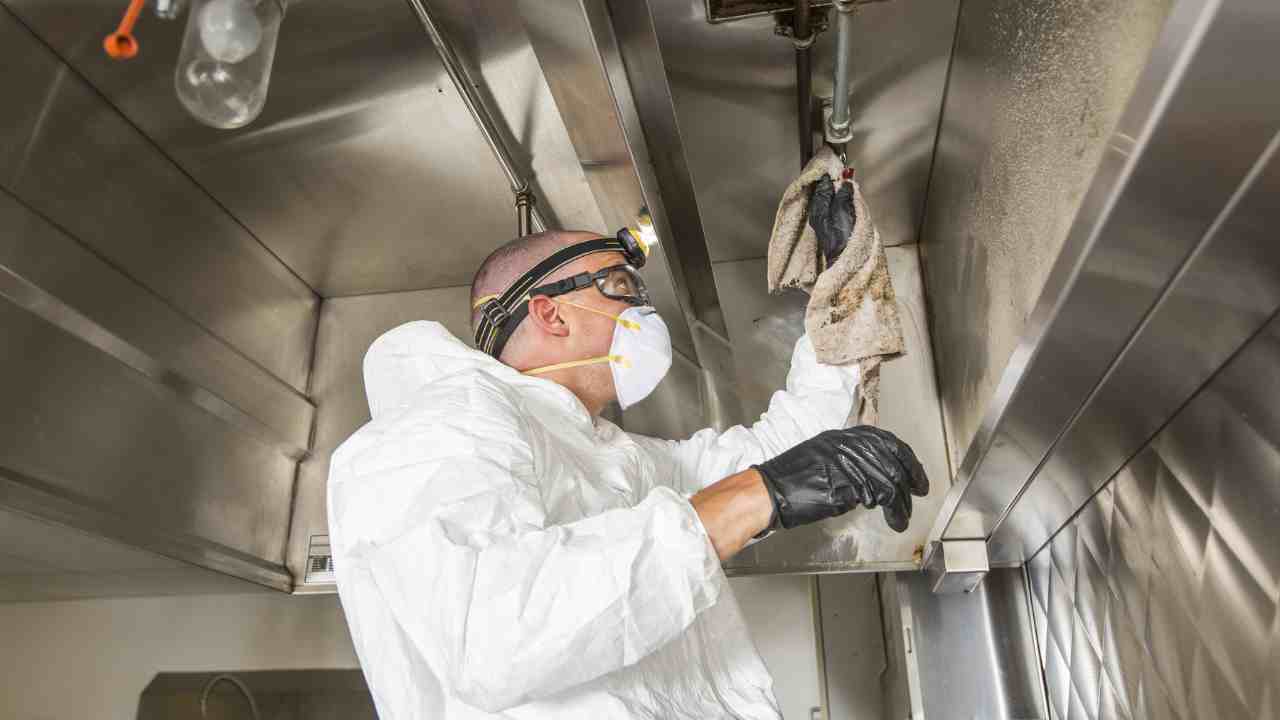How To Choose The Right Cleaning Materials For Kitchen Exhaust

Ontario-wide Kitchen Exhaust and Hood Cleaning – Best prices and service guaranteed.
The kitchen exhaust system plays a crucial role in maintaining a clean and safe environment in any commercial kitchen. Over time, grease, oil, and other contaminants can accumulate in the exhaust system, posing a fire hazard and compromising air quality. Regular cleaning is essential to prevent these issues and ensure the efficient operation of the system. However, choosing the right cleaning materials for kitchen exhaust can be a daunting task. In this article, we will explore the factors to consider when selecting cleaning materials and provide valuable insights to help you make an informed decision.
The Importance of Proper Cleaning
Before diving into the details of choosing the right cleaning materials, it is important to understand why proper cleaning of the kitchen exhaust system is crucial. Here are a few key reasons:
- Fire Safety: Grease buildup in the exhaust system can ignite and cause a fire. Regular cleaning helps remove these flammable substances, reducing the risk of fire.
- Air Quality: A dirty exhaust system can release harmful pollutants into the air, compromising the health and safety of kitchen staff and customers. Proper cleaning ensures good air quality.
- Efficiency: A clean exhaust system operates more efficiently, improving ventilation and reducing energy consumption.
-
Ontario-wide Kitchen Exhaust and Hood Cleaning – Best prices and service guaranteed.
Factors to Consider When Choosing Cleaning Materials
Now that we understand the importance of proper cleaning, let’s explore the factors to consider when choosing cleaning materials for kitchen exhaust:
1. Safety
Safety should be the top priority when selecting cleaning materials. The chemicals used should be non-toxic, non-flammable, and safe for both the cleaning staff and the environment. Look for cleaning products that are certified by reputable organizations and comply with safety regulations.
2. Effectiveness
The cleaning materials should be effective in removing grease, oil, and other contaminants from the exhaust system. Look for products that have been specifically formulated for kitchen exhaust cleaning and have a proven track record of success. Consider reading customer reviews and case studies to gauge the effectiveness of the cleaning materials.
3. Compatibility
Ensure that the cleaning materials you choose are compatible with the materials used in your kitchen exhaust system. Different types of exhaust systems may require different cleaning solutions. For example, if you have a stainless steel exhaust system, make sure the cleaning materials are safe for use on stainless steel surfaces.
4. Ease of Use
Consider the ease of use of the cleaning materials. Look for products that are easy to apply and require minimal effort to achieve desired results. This will not only save time but also improve the efficiency of the cleaning process.
5. Environmental Impact
Choose cleaning materials that have a minimal environmental impact. Look for products that are biodegradable and do not contain harmful chemicals that can pollute waterways or harm wildlife. Consider the packaging of the cleaning materials as well and opt for products that use recyclable or eco-friendly packaging.
6. Cost
Consider the cost of the cleaning materials. While it is important to choose high-quality products, it is also essential to find a balance between effectiveness and affordability. Compare prices and evaluate the cost-effectiveness of the cleaning materials before making a decision.
Ontario-wide Kitchen Exhaust and Hood Cleaning – Best prices and service guaranteed.
Examples of Cleaning Materials
Now that we have discussed the factors to consider, let’s explore some examples of cleaning materials that are commonly used for kitchen exhaust cleaning:
1. Degreasers
Degreasers are powerful cleaning agents designed to remove grease and oil from surfaces. They are available in various forms, including liquid, foam, and aerosol. When choosing a degreaser, look for one that is specifically formulated for kitchen exhaust cleaning and is safe for use on the materials used in your exhaust system.
2. Detergents
Detergents are effective in removing dirt, grime, and other contaminants from surfaces. They are available in both liquid and powder form. Look for detergents that are suitable for kitchen exhaust cleaning and have a good reputation for their cleaning capabilities.
3. Solvents
Solvents are commonly used to dissolve grease and oil. They are available in various types, including mineral spirits, alcohol, and citrus-based solvents. When using solvents, ensure proper ventilation and follow safety guidelines to prevent any health hazards.
4. Brushes and Scrubbers
Brushes and scrubbers are essential tools for physically removing grease and grime from surfaces. Look for brushes and scrubbers that are designed for kitchen exhaust cleaning and have bristles or pads that are suitable for the materials used in your exhaust system.
Ontario-wide Kitchen Exhaust and Hood Cleaning – Best prices and service guaranteed.
Choosing the right cleaning materials for kitchen exhaust is crucial for maintaining a clean and safe environment in commercial kitchens. Safety, effectiveness, compatibility, ease of use, environmental impact, and cost are important factors to consider when making a decision. Degreasers, detergents, solvents, brushes, and scrubbers are some examples of cleaning materials commonly used for kitchen exhaust cleaning. By carefully considering these factors and selecting the appropriate cleaning materials, you can ensure the efficient operation of your kitchen exhaust system and promote a healthy and safe environment for all.
Learn more about “How to clean out a kitchen exhaust system” right here.
Frequently asked questions about How To Choose The Right Cleaning Materials For Kitchen Exhaust

Why is it essential to choose the right cleaning materials for my kitchen exhaust?
Think of your kitchen exhaust as the lungs of your kitchen. Just like we need clean air to breathe, our kitchens require clean exhausts to function efficiently and safely. Using the right cleaning materials ensures that grease, dirt, and contaminants are removed effectively, reducing fire risks and improving air quality. Moreover, the correct cleaning materials can extend the lifespan of your exhaust system, saving you money in the long run. It’s not just about having a sparkling clean kitchen; it’s about creating a safer and healthier environment for you and your loved ones.
With so many cleaning products available, how do I know which ones are safe for my kitchen exhaust?
That’s a great question! First, always look for products labeled as “kitchen-safe” or “non-toxic.” This ensures that any residue left behind won’t harm your health or the foods you prepare. Additionally, consider eco-friendly or green products. They’re not only safe for the environment but also tend to be gentler on your appliances. Reading reviews and asking for recommendations can also be a handy way to identify reliable brands and products. Lastly, check if the cleaner is designed for the specific material of your exhaust, whether it’s stainless steel, aluminum, or another material.
Are homemade cleaning solutions a good choice for kitchen exhausts?
Homemade cleaning solutions, like mixtures of vinegar and baking soda, can be effective for light cleaning tasks. They’re eco-friendly, cost-effective, and safe for most surfaces. However, for heavy grease build-up or more stubborn stains, you might need something more potent. If you decide to go the homemade route, make sure to test a small, inconspicuous area first to ensure the solution doesn’t damage or discolor your exhaust.
How often should I clean my kitchen exhaust, and does the cleaning material choice affect the frequency?
Regular cleaning is the key to maintaining an efficient and safe kitchen exhaust system. At a minimum, you should clean the exterior of your exhaust hood every month and the interior every three to six months. However, if you cook frequently or prepare a lot of fried or greasy foods, you might need to clean it more often. The choice of cleaning material can indeed affect the frequency. If you use a high-quality cleaner designed for exhaust systems, it may offer more prolonged protection against grease and dirt build-up, potentially reducing the need for frequent cleanings.
Besides cleaning materials, are there any tools or accessories I should consider for cleaning my kitchen exhaust?
Absolutely! A good scrubbing brush with stiff bristles can be invaluable for tackling tough grease spots. Microfiber cloths are great for wiping down the surface without scratching it. For hard-to-reach areas, consider an extendable duster or a specialized exhaust cleaning brush. Additionally, investing in a quality grease filter can minimize the amount of grease that accumulates, making your cleaning tasks easier. Remember, the right tools combined with the right cleaning materials can make all the difference in maintaining a clean, efficient, and safe kitchen exhaust system.
- hood cleaning
- How To Choose The Right Cleaning Materials For Kitchen Exhaust
- kitchen exhaust cleaning
- restaurant hood cleaning







